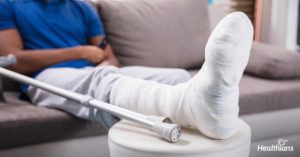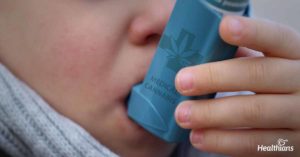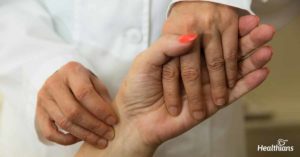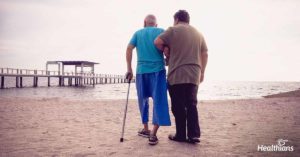Contributed by – Healthians Team
Physical movement, whether total or partial, can be hampered due to various ailments. It can happen in the case of bedridden patients or those who have any major injuries. Due to no movement digestion becomes difficult. Metabolism is slow and thus having meals that give all the required nutrients but is also easy to digest is important.
Family members of people with restricted movement usually have a tough finding the answer to the question: How to plan a diet? We have compiled some simple points that will help in planning an ideal meal plan for patients suffering from diseases or injuries with the hindered movement which will have all the required nutrients for faster healing.

Patients of Fractures, Spinal Injuries, Nerve Disorders, Stroke and Parkinson disease
- Opt for a balanced diet and a low-calorie diet. Since the movement is hampered, the calorie burning capacity of the body is deterred. Hence, a low carb diet and fiber-rich diet is the best option.
- Restrict the use of oil and fat in the food and choosing skimmed milk or skimmed milk products is beneficial as it is low in fat.
- Breakfast should be light and low in carbs. More and more vegetables should be included in breakfast. Poha, oats, upma, or vermicelli are some healthier options available.
- Instead of having three main meals, have small frequent meals to aid the digestion.
- Go for homemade soups and restrict the intake of coffee or tea. Excessive intake can lead to a jump in cholesterol and blood pressure.
- Midday snacks can be replaced by fruits and vegetable instead of having pakoras, chips and fast food.

Patients of Tuberculosis
- Patients of Tuberculosis suffer from weight loss. Having a diet rich in nutrients is very important for them to regain strength. A protein-rich diet is recommended for such patients.
- Rather than high cholesterol meat choosing lean fat meat is a healthier option.
- Certain foods may go against the medication. Hence diet plan should be discussed with a doctor or dietician.
- In TB, the patient’s liver and kidney are already burdened from various medications. Thus alcohol should be avoided.
- Foods like cabbage, broccoli, pasta and beans should be avoided because they can cause gastric problems.

Patients of respiratory problems
- People suffering from respiratory problems should restrict their intake of cold food and cold drinks.
- People may have a problem in swallowing. They should go for semi-solid foods.
- Posture is very important. Sit in an upright posture especially while eating.
- Spicy food can cause digestive issues. Hence keeping a check on the spices used in meals is a must. It elevates burning sensation, acid influx and gastric problems.

Exercising
Exercise plays an important role in keeping the weight under control. But due to restricted movement, a person may face difficulties in physical activities. Hence special care has to be taken to exercise movable limbs and muscles. Seek guidance from a physiotherapist, acupressure expert and yoga experts. Those who can should try walking slowly but steadily for 10-15 minutes 3-4 times a day. Exposure to sunlight is also crucial. Schedule the day in a way that the patient can sit in the morning sun for sometime daily.

Hygiene
Hygiene is a must. Bedridden patients often experience leakage of urine or stool or vomiting in bed. Their clothes, bed sheets and pillow covers should be religiously changed every day. The mattress should be kept under the sun often. Bed sores are also a big challenge. Hence cleanliness is extremely important.
Bedridden patients or patients with limited movement are always dependant on their families. Thus the roles of the family members become crucial. They are advised to provide their maximum support and encouraging attitude towards the patients. This will only help them in maintaining a healthy mental state and will also aid in the recovery process.




